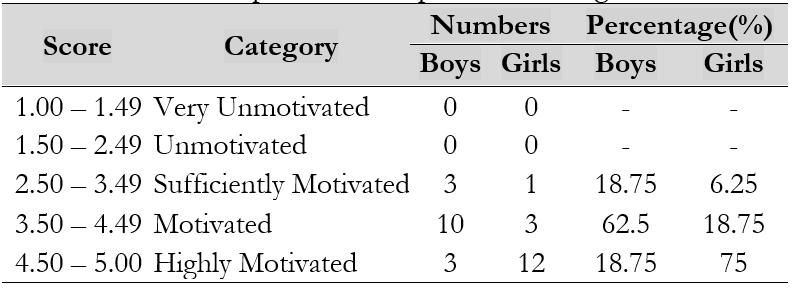
The Impact of Problem-Solving Model on Students’ Concept Mastery and Motivation in Learning Heat Based on Gender
Abstract
This study investigated the impact of the problem-solving model on students’ concept mastery and motivation in learning heat based on gender. The method which was used in this research was quasi-experiment with pretest-posttest design in girls and boys class. Data are collected from girl class (N=16) and boys class (N=16) of a 7th grade in one of a Bilingual Boarding School in Bandung. The quantitative data of this research was obtained through the objective test, while the qualitative data was gained through a questionnaire. Students’ motivation is measured by Attention, Relevance, Confidence, and Satisfaction (ARCS) Model. On the other hand, students’ concept mastery is measured based on Bloom’s taxonomy cognitive level through the objective test and being analyzed by using statistical software Statistical Package for Social Science (SPSS) version 20.0 for Windows 8. The results show that overall concept mastery of girls and boys students have improved. However, girls students are higher achiever than boys. Overall, the problem-solving model makes an improvement in students’ concept mastery in both girls and boys. Thus, it indicates that the implementation of the problem-solving model in learning heat can improve students’ motivation and students’ conceptual understanding in secondary level.
Keywords
Problem-solving model; students’ concept mastery; students’ motivation; heat; gender
Full Text:
DOWNLOAD PDFDOI: https://doi.org/10.17509/jsl.v1i2.9793
Refbacks
- There are currently no refbacks.
Copyright (c) 2018 Annisa Utami Putri

This work is licensed under a Creative Commons Attribution-ShareAlike 4.0 International License.


Journal of Science Learning is published by Universitas Pendidikan Indonesia
in collaboration with the Indonesian Society of Science Educators
Jl. Dr. Setiabudhi 229 Bandung 40154, West Java, Indonesia
View My Stats
Jl. Dr. Setiabudhi 229 Bandung 40154, West Java, Indonesia











